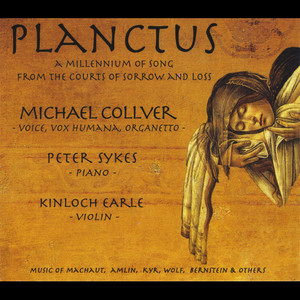
Planctus - A Millennium of Song From the Courts of Love and Loss
- 歌唱: Michael Collver
- 发行时间:2010-12-14
- 类型:录音室专辑
- 歌曲
- 时长
-
作曲家:Public Domain|arranged by Michael Collver
-
作品集:St Martin Limoges, Ms. P887
-
作曲家:Martin Amlin
-
作品集:Four Songs on Texts of Anonymous Poets, Op. 13
-
作曲家:Guillaume de Machaut
-
作品集:L16
-
作曲家:Robert Kyr
-
作曲家:Gotfridus de St. Victor
-
作品集:Carmina Burana, CB14
-
作曲家:Hugo Wolf
-
作品集:Mörike-Lieder, Op. 22
-
作曲家:Public Domain
-
作曲家:Leonard Bernstein
-
作品集:Symphony No.1 "Jeremiah"
简介
Laments (Latin: Planctus) have existed in all cultures for as long as there has been song. Expressing affection, joy, sorrow and grief for people, places, or ideas that have gone from our lives, lamentations are how we deal with loss. Joined by Peter Sykes – piano and Kinloch Earle – violin, this album is a compilation of laments Collver has performed since 1993 Swan songs are so named for the myth of the Swan (Cygnus) that is without song throughout its life but when faced with its own death breaks into a final wailing lament. The first swansong, Planctus cygni, is an anonymous sequence from the Winchester Troper (St Martial, early 11th century). In this Christian allegory of salvation, the swan - lost and starving at sea, finds a safe haven guided by Dawn's light. The second swansong, The Silver Swanne, is a contemporary setting, by Boston composer Martin Amlin, of a 16th century madrigal text that refers to Aesop's fable of the Swan and Goose. In this version, however, the swansong does not save the swan. Lost love was a predominant subject of the Trouvere poet-composer Guillaume de Machaut (ca 1300-1377). In "le Lay de Plour", Machaut poignantly expresses a woman's lament over her lover's death. Lament for the UnNamed, composed by Robert Kyr in 1993, sets the text of Kathleen Raine's poem, "Purify", as a universal lament for the fate of mankind. "Planctus Mariae", Mary's lament at the foot of the cross, is one of the most poignant and personal expressions of spiritual lamentation. The sequence "Planctus ante nescia", from the 13th century Carmina Burana Ms, is perhaps the best known of the Marian Planctus. "Seufzer", is a Marian lament from Hugo Wolf's song-cycle of poems by Eduard Mörike. This version sets the 6th century passion hymn text that served as the inspiration for Mörike's poem. Lamentations of the Prophet Jeremiah on the loss and destruction of Jerusalem serve as the Hebrew text source for the third movement of Leonard Bernstein's Jeremiah Symphony #1. This arrangement for piano and voice allows for a more of a chant-like (rather than an operatic) rendition. Lamentation is preceded by the opening Lines of Psalm 137, "Super flumina Babylónis", set in the style of St. Martial Medieval polyphony.


